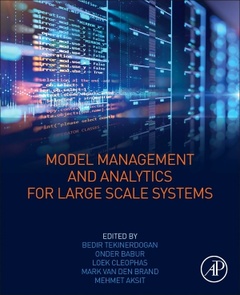Model Management and Analytics for Large Scale Systems

Model Management and Analytics for Large Scale Systems covers the use of models and related artefacts (such as metamodels and model transformations) as central elements for tackling the complexity of building systems and managing data. With their increased use across diverse settings, the complexity, size, multiplicity and variety of those artefacts has increased. Originally developed for software engineering, these approaches can now be used to simplify the analytics of large-scale models and automate complex data analysis processes. Those in the field of data science will gain novel insights on the topic of model analytics that go beyond both model-based development and data analytics.
This book is aimed at both researchers and practitioners who are interested in model-based development and the analytics of large-scale models, ranging from big data management and analytics, to enterprise domains. The book could also be used in graduate courses on model development, data analytics and data management.
Part 1. Concepts and challenges
1. Introduction to modelmanagement and analytics
2. Challenges and directions for a community infrastructure for Big Data-driven research in software architecture
3. Model clone detection and its role in emergent model pattern mining
4. Domain-driven analysis of architecture reconstruction methods
Part 2. Methods and tools
5. Monitoring model analytics over large repositories with Hawk and MEASURE
6. Model analytics for defect prediction based on design-level metrics and sampling techniques
7. Structuring large models with MONO: Notations, templates, and case studies
8. Delta-oriented development of model-based software product lines with DeltaEcore and SiPL: A comparison
9. OptML framework and its application tomodel optimization
Part 3. Industrial applications
10. Reducing design time and promoting evolvability using Domain-Specific Languages in an industrial context
11. Model analytics for industrialMDE ecosystems
Önder Babur is a post-doctoral researcher in the Software Engineering & Technology (SET) group at Eindhoven University of Technology. He holds a PhD from Eindhoven University of Technology, The Netherlands; MSc from RWTH Aachen, Germany and BSc from METU, Turkey. He has further experience as a software engineer in Germany and as a researcher in Spain. His main research interests lie in the fields of model-driven engineering, software architectures, domain-specific languages, and recently applied data mining and machine learning for those domains. Over the years, he has been involved in a number of research projects on automotive software engineering and software product lines, green computing and multiscale modeling for computational science. He currently focuses on data science and machine learni
- Identifies key problems and offers solution approaches and tools that have been developed or are necessary for model management and analytics
- Explores basic theory and background, current research topics, related challenges and the research directions for model management and analytics
- Provides a complete overview of model management and analytics frameworks, the different types of analytics (descriptive, diagnostics, predictive and prescriptive), the required modelling and method steps, and important future directions
Date de parution : 09-2019
Ouvrage de 344 p.
19x23.3 cm
Mots-clés :
ADONIS; architectural analysis; architecture reconstruction methods; BPM; clustering; co-evolution; defect prediction; delta modeling; design-level metrics; diagram type; domain analysis; Domain-Specific Languages; evolvability; feature modeling; graph databases; large-scale modeling; MagicDraw; Matlab/Simulink; model analytics; model clone detection; model clones; model modularity; model optimization; model outline; model pattern mining; model patterns; model structure; model type; Model-Based Engineering; model-based software product line; Model-Driven Engineering; modularity; MONO; multiquality optimization; OptML Framework; sampling techniques; schedulability analysis; simulation; software defects; software ecosystems; software maintenance; software metrics; topic modeling; UML; validation



